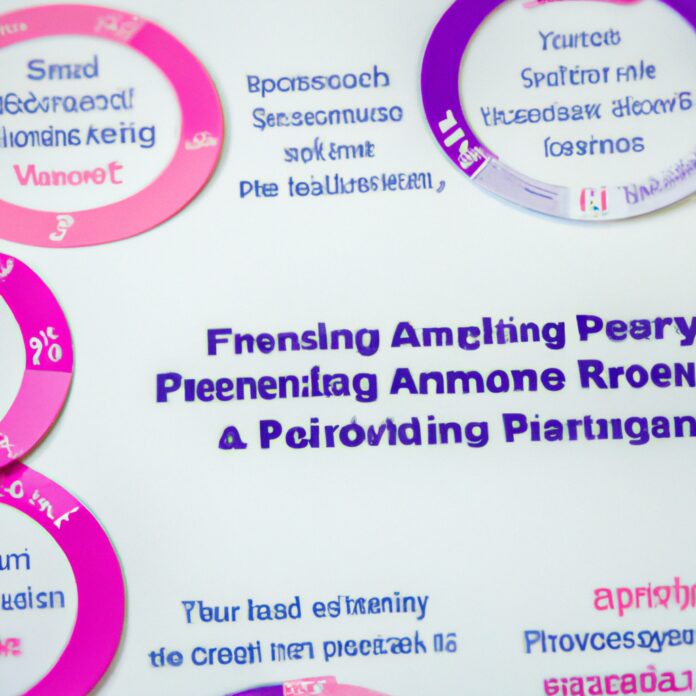It’s a topic that’s often swept under the rug, discussed in hushed tones with only a select few people: fertility awareness. Yet understanding your body’s natural rhythms and cycles can be empowering and even life-changing, particularly for couples who are planning to start a family. Whether you’re just beginning to consider parenthood or have been trying to conceive for some time, delving into the world of fertility can feel overwhelming. But with the right information and resources, fertility awareness can become a valuable tool in your journey to becoming a parent. So let’s start at the beginning: understanding your cycle.
1. “Decode Your Body’s Signals: An Introduction to Fertility Awareness”
Fertility awareness is a natural approach to family planning and reproductive health. By understanding your body’s signals, you can learn when you are fertile and infertile. This knowledge can help you avoid pregnancy or increase your chances of conceiving.
There are several methods of fertility awareness, but they all involve tracking changes in cervical mucus, basal body temperature, and/or hormone levels. By charting these changes, you can identify patterns in your menstrual cycle and predict when ovulation will occur.
One of the benefits of fertility awareness is that it does not involve synthetic hormones or medical procedures. It can also be used to monitor and treat common reproductive health issues, such as irregular periods, PMS, and PCOS.
However, fertility awareness requires commitment and knowledge. It is important to learn from a trained instructor and utilize reliable resources. Additionally, it is not foolproof and may not be appropriate for everyone.
If you are interested in learning more about fertility awareness, take the time to research and find a reputable instructor. With patience and practice, you can decode your body’s signals and take control of your reproductive health.
2. “Charting Your Cycle: The Science and Art of Tracking Fertility”
Tracking your fertility is a complex yet empowering process that allows you to take control of your reproductive health. At its core, charting your cycle involves recording changes in your body that signal ovulation, including basal body temperature, cervical mucus, and hormone levels. While there is a scientific aspect to this process, there is also an art to interpreting the data and finding patterns unique to your body.
One essential component of charting your cycle is using a fertility tracking app or paper chart. These tools not only provide a convenient way to record your data but can also track trends over time and help identify potential issues. Additionally, it’s essential to educate yourself about fertility and the menstrual cycle, including the phases of the menstrual cycle and how hormones like estrogen and progesterone affect ovulation.
Perhaps one of the most significant benefits of tracking your fertility is the ability to understand and predict your menstrual cycle. This knowledge can help you plan for pregnancy or avoid it by using natural family planning methods. By charting your cycle, you can also gain insight into any potential underlying health issues that may be affecting your fertility, such as thyroid disorders or PCOS.
In conclusion, charting your cycle is a vital tool for understanding your reproductive health and taking control of your fertility. While it requires time and commitment, the benefits can be life-changing. Whether you’re trying to conceive or want to better understand your body, tracking your fertility is an excellent way to gain insight and take charge of your reproductive health.
3. “From Conception to Birth: Planning Your Parenthood Journey”
Planning a parenthood journey can be a daunting task. From deciding when to have a baby to choosing a healthcare provider, there are various factors to consider. Here are some tips that can help you plan your journey towards parenthood:
• Establish A Preconception Health Plan: By scheduling a preconception checkup, you can identify any underlying health issues. You should visit a healthcare professional to ensure that you are on track to meet your goal. This way, you can address any health issues before getting pregnant and increase the chances of a healthy pregnancy and baby.
• Decide on a Healthcare Provider: Choosing a healthcare provider for your pregnancy is an important decision. Factors such as location, insurance, and personal preferences can play a role in selecting a provider. Make sure you ask potential providers questions about their experience, approach to care, and the duration of appointments.
• Educate Yourself: Parenthood is a new experience, and it is essential to learn as much as possible before the baby arrives. Start by reading books, talking to other parents, and attending classes. Knowledge can ease any anxieties that you may have about parenting and make the experience more enjoyable.
By following these tips, you can set yourself up for a successful and fulfilling parenthood journey. Remember to take your time, make informed decisions, and seek support when necessary.
4. “Exploring Natural Fertility Methods: Tools for Improved Reproductive Health”
In today’s world, fertility problems have become more and more common. Couples often struggle to conceive, and many turn to expensive medical treatments without considering the natural methods that can improve their reproductive health. Luckily, there are a number of tools available that can help couples explore their natural fertility methods, and improve their chances of conceiving.
One of the most popular tools for improving reproductive health is the fertility chart. This chart helps women track their menstrual cycle, and monitor changes in their body that can signal ovulation. By tracking these changes, women can identify their most fertile days, and plan intercourse accordingly. Fertility charts can be used in conjunction with other natural methods, such as cervical mucus monitoring and basal body temperature tracking.
Another tool for improving reproductive health is acupuncture. This ancient Chinese technique has been used for centuries to treat a variety of health conditions, including fertility problems. Acupuncture can help regulate menstrual cycles, stimulate ovulation, and improve sperm quality and motility in men. It can also help reduce stress, which is a common cause of infertility.
Other natural fertility methods include lifestyle changes such as exercise and diet, as well as herbal supplements and homeopathy. While these methods may not work for everyone, they are a great option for couples who want to improve their reproductive health without the use of expensive medical treatments. By exploring these natural methods, couples can take control of their fertility, and increase their chances of conceiving.
5. “Fertility Awareness and the Modern Woman: Empowering Choices”
As women become increasingly informed about their reproductive health, fertility awareness is gaining popularity as a means to make informed choices about their bodies. Fertility awareness methods involve tracking changes in a woman’s menstrual cycle to identify the time when she is most likely to conceive.
With advancements in technology and access to digital tools, fertility awareness is now more accessible and convenient than ever before. Women can use mobile apps to track their menstrual cycle, record body temperature, and monitor cervical mucus to determine their fertile window. This information can be used for contraception, pregnancy planning, or to monitor fertility health.
- Boldly taking control of their reproductive health:
- Empowering themselves with fertility awareness and making informed choices.
Despite the benefits of fertility awareness, there is a lack of education and understanding about these methods. It is important for women to have access to reliable information and resources to make informed decisions about their reproductive health. With the help of online communities, women can share their experiences and support each other in their journey towards empowering choices.
6. “Breaking the Taboo: How Fertility Awareness Can Help You Take Control of Your Reproductive Health”
Fertility awareness is a term used to describe a variety of methods that help women track their menstrual cycle and identify when they are ovulating. By understanding their body’s natural patterns, women can take control of their reproductive health and make informed decisions about contraception or trying to conceive.
Breaking the taboo surrounding fertility awareness is important because it gives women a more comprehensive picture of their fertility. Often, we’re taught to rely on birth control methods that may not be right for our bodies, or to assume that we won’t get pregnant unless we’re actively trying. By tracking our menstrual cycles and identifying ovulation, however, we can better understand our chances of getting pregnant and make more informed choices about our reproductive health.
One of the key benefits of fertility awareness is that it allows women to tell when something is off with their bodies. If you notice changes in your menstrual pattern or find it difficult to track ovulation, it could be a sign of an underlying health issue. By knowing what’s normal for your body and what’s not, you can take action to address any problems early on.
Overall, fertility awareness is an empowering tool that helps women take control of their reproductive health. By breaking the taboo surrounding this topic and educating ourselves on these methods, we can make more informed decisions and lead healthier, happier lives.
7. “Fertility Awareness Beyond Parenthood: Discovering the Benefits of Knowing Your Cycle”
In the past, fertility awareness has primarily been associated with women hoping to conceive. However, understanding your menstrual cycle can offer a multitude of benefits beyond just family planning. Here are some ways that knowing your cycle can benefit your overall health and wellbeing:
– Hormonal balance: By tracking your menstrual cycle, you may notice any irregularities or imbalances in your hormones. This awareness can help you identify potential health concerns and take proactive steps towards addressing them.
– Natural contraception: If you’re not interested in hormonal birth control or condoms, fertility awareness can be an effective method of natural contraception. By knowing when you are most fertile, you can avoid sexual intercourse during that time to prevent pregnancy.
– Riding the emotional wave: Your menstrual cycle can have a significant impact on your mood and emotions. By tracking your cycle, you can anticipate and prepare for any hormonal fluctuations that may affect your mental wellbeing.
– Optimizing exercise: Different phases of your menstrual cycle may be better suited for certain types of exercise. For example, during your follicular phase (when your estrogen levels are on the rise), you may have more energy for high-intensity workouts. In contrast, during your luteal phase (after ovulation), you may feel more fatigued and benefit from lower-impact activities like yoga or Pilates.
Whether you’re trying to conceive or simply looking to better understand your body, fertility awareness can be a valuable tool. By tuning into your cycle, you can gain insights into your hormonal health, optimize your exercise routine, and even make informed decisions about contraception.
In conclusion, fertility awareness is a powerful tool that allows individuals to better understand their bodies and take control of their reproductive health. By tracking and interpreting various physical signs and symptoms throughout the menstrual cycle, individuals can gain insights into their unique fertility patterns and make informed decisions about planning for or delaying parenthood. Whether you are trying to conceive or simply seeking to deepen your understanding of your body, fertility awareness can be a transformative practice that empowers you to take charge of your fertility and overall well-being. So why not give it a try and see where this journey takes you?





